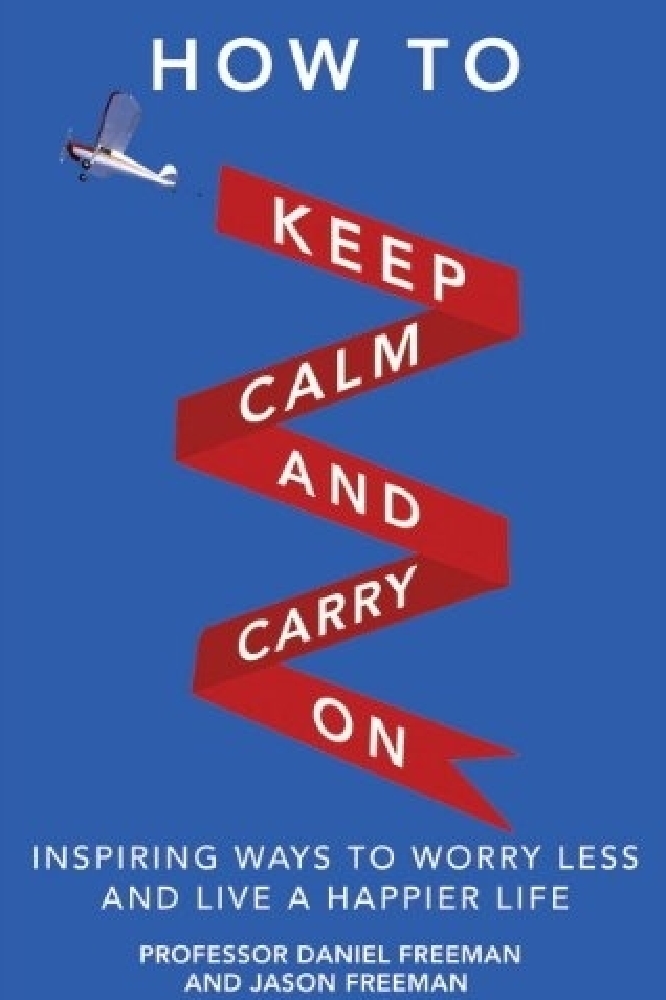
How to Keep Calm and Carry On
How to Keep Calm and Carry On is about anxiety, which is a problem that increasing numbers of us seem to be facing. One recent survey, for example, found that more than a third of adults in the UK reported feeling more anxious than they did in the past. At the relatively severe end of the spectrum, anxiety disorders are (with depression) the most common type of psychological problem.
Happily, anxiety has been the focus of much cutting-edge psychological research in recent years. The treatments that have emerged from that research have been comprehensively tested in large-scale clinical trials. And the results of those trials show that these techniques really work.
How to keep calm is all about showing readers how to use those techniques to overcome their own anxiety, to conquer their stress, and to feel more relaxed and content. It's very much a practical book. It's not full of jargon or theory; we talk readers through the specific steps they can take to reduce their anxiety and boost their happiness.
Why is Britain on the verge of a stress epidemic?
There's little doubt that the current economic difficulties have played a part: more and more people are struggling to make ends meet; worrying about their jobs; and fearful about what the future holds. There may be particular pressures for women - among whom rates of anxiety are around twice as high as for men. Increasingly, women are expected to function as carer, homemaker, and breadwinner – all while being perfectly shaped and impeccably dressed. Given that domestic work is undervalued, and considering that women tend to be paid less, find it harder to advance in a career, have to juggle multiple roles, and are bombarded with images of apparent female “perfection”, it would be surprising if there weren’t some emotional cost.

What are the likely things that adults worry about for 60 mins each day?
The top topics for worry will probably come as no surprise: our work; our finances; our health; and our relationships.
What exercises can help with stress?
When we’re very stressed or worried or anxious, it’s easy to believe that there’s nothing we can do to feel better – that we just have to endure the tough times. But we have far more control than we think.
How to keep calm includes dozens of exercises and tips to overcome stress. Here's just one, which psychologists call “worry periods”. Set aside fifteen minutes each day, and save all your worrying for then. Choose somewhere private, set the alarm on your mobile phone, and deliberately give yourself up to your worries. Don’t sit on the sofa or lie on your bed: sit at a table on an upright chair. If this feels uncomfortable, so much the better! You don’t want worrying to be in any way relaxing or pleasurable. If you find yourself worrying at other times of the day, stop. Write down what’s on your mind and tell yourself that you’ll think it through later.
Please can you tell us about on quick wins to reducing stress?
We all know that we're supposed to eat healthily and get plenty of sleep. But what we may not realize is the incredibly beneficial effect these basics can have on our ability to handle stress. Get these two right and you'll be amazed at how much more positive you feel.
We also recommend the "five a day for mental health":
* Connect: Make time for the people who matter in your life. Life being what it is, it’s easy for the fun stuff to get squeezed out by work and domestic chores. If that’s a problem for you, fight back! Make an arrangement with your partner, family, or friends and schedule it into your diary. And ensure that you’ve always got something lined up to look forward to.
* Be physically active: There’s increasing evidence that exercise can really boost our psychological well-being. Exactly what form of exercise you take doesn’t much matter. What you’re looking for is an activity that gives your cardiovascular system – your heart and lungs – a proper workout. Aim to be physically active for at least thirty minutes several times a week.
* Be curious: People who are happy seem to have the knack of finding something of interest among even the most ordinary aspects of life. But even if curiosity doesn’t come naturally, we can all learn to develop it.
* Learn: it feels great to be trying something new, and to realize that you’re steadily becoming more competent at something you enjoy. So ask yourself: what would I like to learn today? And then go for it!
* Give: The evidence is clear: people who help others – who give their time, attention, and energy – are happier than individuals who simply look after number one.
Please can you tell us a bit about your backgrounds?
Perhaps surprisingly, we can trace our collaboration back to a precise date: 17 November 2002.
On that day we were watching our football team, Watford FC, subside to a home defeat against Ipswich Town. We’ve long since forgotten the details of the game, but what really sticks in the memory is a discussion of Daniel’s research as a clinical psychologist into paranoia, and particularly his discovery that a far greater number of people regularly experience such feelings than had previously been assumed.

Wouldn’t it be great, we mused, if there were a book to help people cope with their paranoid thoughts? And wouldn’t it be fun if we were to combine Daniel’s clinical expertise with Jason’s editorial and publishing experience in order to write such a book together? That’s exactly what we did. Overcoming Paranoid and Suspicious Thoughts was published in 2006, but the project had been so enjoyable and rewarding that we resolved to continue our partnership. What we wanted to do was make the very best psychological research accessible to the widest possible audience, producing books that were simultaneously scientifically credible and engagingly written. And that remains our objective today, eight books and countless articles and interviews later.
How can low level worry negatively impact you?
When we worry, we tend to focus on the negative, and we can spend a lot of time worrying about things that probably won’t happen. We become very skilled (and imaginative) at the sort of “what if?” thinking that always foresees the worst possible outcome for any situation (psychologists call this "catastrophising"). And once we start worrying, it can be hard to stop. Our worries can seem uncontrollable. Not surprisingly, this kind of thinking can make it very difficult for us to enjoy life as we once did and leave us feeling anxious and depressed.
What is a certifiable anxiety disorder?
Essentially it comes down to how long a person has been suffering from the problem; how severe it is; and how much it interferes with their ability to lead a normal life.
There are six main types of anxiety disorders:
- Phobias
- Social phobia (in which certain social situations make the person very anxious)
- Panic disorder
- Generalised anxiety disorder (a particularly severe form of worry)
- Obsessive-compulsive disorder
- Post-traumatic stress disorder
The term “anxiety disorder” may be a bit frightening for some people. It can sound horribly medical – scarily “psychiatric”. But remember that anxiety disorders are, with depression, by far the most common of all psychological problems.
What is next for you both?
We have another book out this year, called The Stressed Sex: Uncovering the Truth about Men, Women, and Mental Health. In it, we ask who is more likely to develop mental health problems: men or women? And if there are differences between the sexes, what are the possible causes? It's an issue that has been pretty much ignored by mental health professionals, but a really fascinating and important one.
How to Keep Calm and Carry On - Buy Now >>

